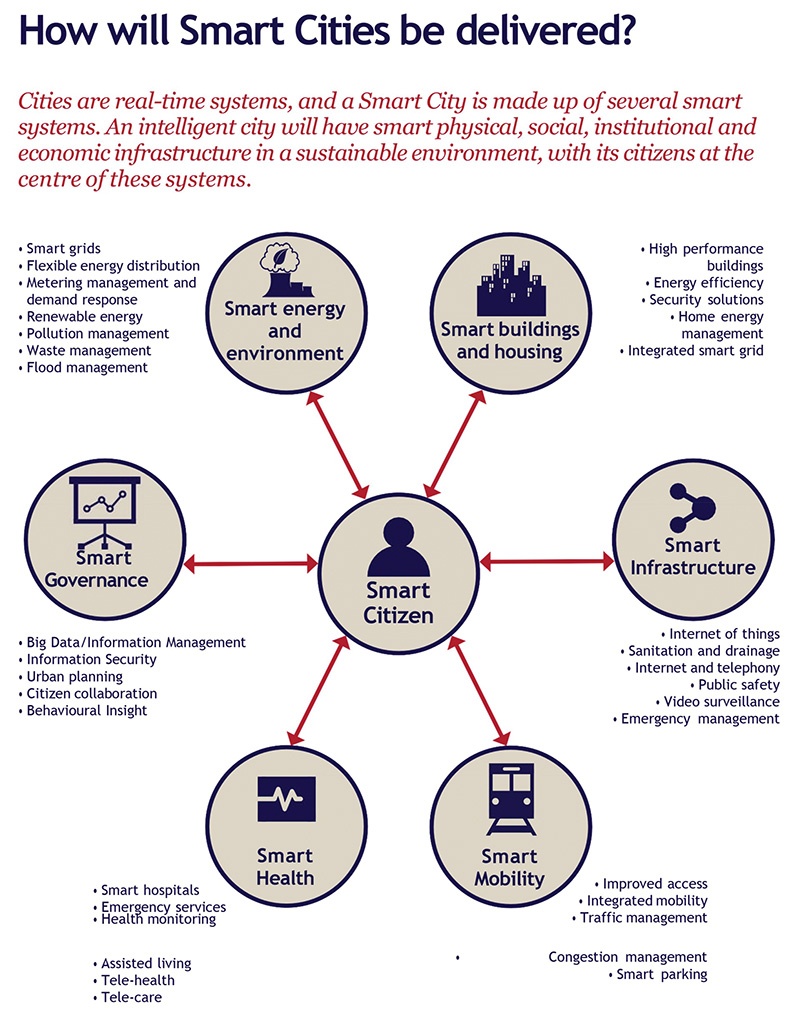Securing smart city breakthroughs
 |
| By Dr. Alan Cuong Nguyen - MArch (Hons), PG (Dip) RIBA, PhD Associate Design Studio Architects, UK |
There is no formal definition of a smart city, which sometimes is also referred to as future city or a connected place. We can use the definition of the UK’s Parliamentary Office of Science and Technology (POST) from September which defines smart cities as “the use of digital technologies and data to improve places by providing citizens with social, economic, and environmental benefits.”
The rapid global urbanisation trend has created many challenges to our societies. To accommodate another 2.5 billion people into the urban population by 2050, we urgently need to protect the environment, by implementing sustainable socioeconomic development and tackle climate change.
Smart cities can help local governments and their citizens work together more efficiently, using smart technologies and data to manage assets and resources in a more sustainable way. They are expected to provide a high quality of life to residents, generating economic growth, with better services and reduced infrastructure costs and carbon emissions.
Lessons from developed countries
The Smart Cities Pitchbook 2016 by the UK government’s Trade and Investment Department provides a simple view of how we can deliver smart cities. Smart cities can be implemented by local governments, universities, transport operators, services providers, and other organisations. Different technologies can be applied, depending on the nature and scale of projects. For example, sensors and other devices using the Internet of Things, digital twin modelling, edge computing, and 5G technology can be used for the detection of water leaks or creation of data networks for public services in the city.
Cities across the world are in different stages of smart technology development and implementation. However, there are several front runners such as London, Barcelona, Amsterdam, Tokyo, Dubai, New York City, Toronto, and Melbourne.
Smart city projects are expected to increase productivity, create new jobs, improve safety, and protect the environment, while making public services more efficient and accessible. In 2013, Glasgow invested $33 million of public funding in its Future City project, and by 2017, the initial return on investment was $198 million, with considerable ongoing benefits.
Other UK cities that have also implemented smart cities at different levels, including London, Birmingham, Manchester, Leeds, and Nottingham.
Barriers and risks
According to the POST, despite the great benefits of smart cities, there are certain barriers that remain to be resolved, as well as potential risks that need to be managed.
These barriers include the lack of technical skills and funding within local authorities, especially for complex and large-scale projects; lack of public trust and support; lack of capacity and changing priorities of the local authorities when dealing with more urgent issues such as COVID-19; and a shortage of policies, regulations, and standards. Smart city projects may be subject to many different regulatory frameworks, such as planning, utilities, public sector procurement, and use of personal data. The addition of negotiating public/private data sharing can be a great barrier.
Meanwhile, such potential risks count as security and privacy concerns over the collection of data about citizens’ behaviour, public services, and critical infrastructure, especially the national security and defence system. There is a risk of prioritising the implementation of new technologies over citizens’ needs, and another of overwhelming and uncontrolled influence of smart city technologies that may allow governments and industry to increase their freedom in acting while increasing social inequality.
The implementation of smart cities may increase inequality if these developments are uneven compared to rural and urban communities. They can also disadvantage people without digital skills or access to digital technology.
 |
Smart cities in Vietnam
Developing smart city projects is a big trend in Vietnam, with all the above potential benefits, barriers, and risks applicable. They can provide great benefits for the Vietnamese by improving their quality of life and implementing sustainable development and better management of resources.
However, the existing barriers, as well as the potential risks that smart cities possess worldwide, remain relevant in the context of Vietnam, with its limited resources, underdeveloped infrastructure, and the lack of legislation. Smart cities will not be truly smart without a strong planning and adequate financial and technological capacity.
Perhaps, a more careful and step-by-step approach would be advisable, helping the political will and determination of the government to meet with the trust and support of the Vietnamese people. This would ensure the success of Vietnamese smart cities.
What the stars mean:
★ Poor ★ ★ Promising ★★★ Good ★★★★ Very good ★★★★★ Exceptional
 Tag:
Tag:
Themes: COP26 - Together for Our Planet
Related Contents
Latest News
More News
- Trung Nam-Sideros River consortium wins bid for LNG venture (January 30, 2026 | 11:16)
- Vietnam moves towards market-based fuel management with E10 rollout (January 30, 2026 | 11:10)
- Envision Energy, REE Group partner on 128MW wind projects (January 30, 2026 | 10:58)
- Vingroup consults on carbon credits for electric vehicle charging network (January 28, 2026 | 11:04)
- Bac Ai Pumped Storage Hydropower Plant to enter peak construction phase (January 27, 2026 | 08:00)
- ASEAN could scale up sustainable aviation fuel by 2050 (January 24, 2026 | 10:19)
- 64,000 hectares of sea allocated for offshore wind surveys (January 22, 2026 | 20:23)
- EVN secures financing for Quang Trach II LNG power plant (January 17, 2026 | 15:55)
- PC1 teams up with DENZAI on regional wind projects (January 16, 2026 | 21:18)
- Innovation and ESG practices drive green transition in the digital era (January 16, 2026 | 16:51)






















 Mobile Version
Mobile Version